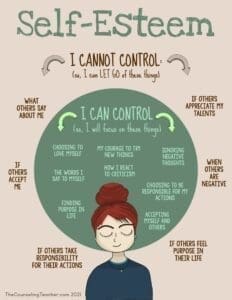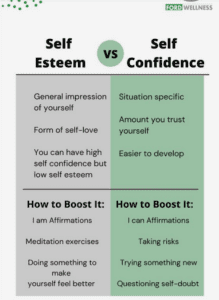Self-care has become a buzzword in recent years, and for good reason. In today’s fast-paced world, it’s easy to prioritize work and other responsibilities over taking care of ourselves. However, neglecting self-care can have a significant impact on our confidence levels. When we fail to prioritize our physical, emotional, and mental well-being, we may begin to feel overwhelmed, stressed, and burnt out. This can lead to self-doubt, anxiety, and a lack of confidence in our abilities. On the other hand, taking the time to care for ourselves can have a transformative effect on our confidence. By engaging in activities that nourish our minds, bodies, and souls, we can boost our self-esteem and develop a deeper sense of self-worth. In this article, we’ll explore the importance of self-care in building confidence, and provide some practical tips for incorporating self-care into your daily routine. So, sit back, relax, and let’s dive into the world of self-care and confidence-building.
What is self-care?
Self-care is the practice of taking deliberate actions to enhance our physical, emotional, and mental well-being. It involves engaging in activities that promote self-love, self-compassion, and self-awareness. Self-care can take many forms, including exercise, meditation, journaling, reading, spending time with loved ones, and engaging in hobbies. The key to self-care is to identify activities that nourish and energize us, and to make them a priority in our daily lives. Self-care is not a luxury; it is a fundamental aspect of maintaining our health and well-being.
Self-care can be broken down into three main categories: physical, emotional, and mental. Physical self-care involves taking care of our bodies through exercise, nutrition, and rest. Emotional self-care involves managing our emotions and nurturing our relationships. Mental self-care involves engaging in activities that promote mental clarity and well-being, such as meditation and journaling. All three categories are interconnected and equally important for our overall well-being.
Why is self-care important for building confidence?
Self-care is essential for building confidence because it helps us develop a positive relationship with ourselves. When we prioritize our self-care, we send a message to ourselves that we are valuable and deserving of love and attention. This, in turn, helps us develop a deeper sense of self-worth and self-esteem. When we feel good about ourselves, we are more likely to take risks, set goals, and pursue our dreams. On the other hand, when we neglect our self-care, we send a message to ourselves that we are not important. This can lead to feelings of self-doubt and a lack of confidence in our abilities.
The benefits of self-care for mental health
Self-care has numerous benefits for our mental health. By engaging in activities that promote self-love and self-compassion, we can reduce feelings of stress, anxiety, and depression. Self-care can also help us develop a greater sense of self-awareness, which can lead to a deeper understanding of our own thoughts, feelings, and behaviors. This can lead to greater emotional stability and resilience in the face of life’s challenges. Additionally, self-care can help us develop a more positive outlook on life, which can lead to a greater sense of well-being and happiness.
The connection between self-care and self-esteem.
Self-care and self-esteem are closely interconnected. When we prioritize our self-care, we send a message to ourselves that we are valuable and deserving of love and attention. This, in turn, helps us develop a deeper sense of self-worth and self-esteem. When we feel good about ourselves, we are more likely to take risks, set goals, and pursue our dreams. On the other hand, when we neglect our self-care, we send a message to ourselves that we are not important. This can lead to feelings of self-doubt and a lack of confidence in our abilities.
Self-care practices to boost confidence
There are many self-care practices that can help boost our confidence. Here are a few ideas:
– Exercise: Regular exercise can help boost our mood and energy levels, and improve our physical health. This, in turn, can lead to greater confidence in our abilities.
– Meditation: Meditation can help reduce feelings of stress and anxiety, and promote greater self-awareness and emotional stability. This can lead to greater confidence in our ability to manage our thoughts and emotions.
– Journaling: Journaling can help us process our thoughts and feelings, and develop a greater sense of self-awareness. This can lead to greater confidence in our ability to understand our own thoughts and emotions.
– Spending time with loved ones: Spending time with loved ones can help us feel more connected and supported, which can boost our confidence in our ability to navigate life’s challenges.
– Engaging in hobbies: Engaging in hobbies can help us develop a sense of mastery and accomplishment, which can boost our confidence in our abilities.
Mindfulness and self-care
Mindfulness is the practice of being present and fully engaged in the current moment. Mindfulness can be a powerful tool for self-care because it can help us develop a greater sense of self-awareness and emotional stability. By being present in the moment, we can better understand our own thoughts and emotions, and develop greater insight into our own patterns of behavior. This, in turn, can help us make more informed choices about how to care for ourselves and boost our confidence in our ability to manage our own well-being.
How to make self-care a daily habit
Making self-care a daily habit can be challenging, but it is essential for our overall well-being. Here are a few tips for incorporating self-care into your daily routine:
– Prioritize self-care: Make self-care a priority in your daily schedule, and treat it as an essential aspect of your overall health and well-being.
– Start small: Begin by incorporating small self-care practices into your daily routine, such as taking a few minutes to meditate or journal.
– Be consistent: Consistency is key when it comes to self-care. Try to engage in self-care activities at the same time each day, or on a regular schedule.
– Be flexible: Life can be unpredictable, and it’s important to be flexible with your self-care routine. If you miss a day or need to adjust your routine, don’t beat yourself up about it. Simply adjust and keep moving forward.
– Get support: Surround yourself with people who support your self-care goals, and seek out resources and tools to help you stay on track.
Common myths about self-care
There are many myths about self-care that can make it challenging to prioritize. Here are a few common myths and the truth behind them:
– Myth: Self-care is selfish.
– Truth: Self-care is not selfish; it is essential for our overall health and well-being. When we prioritize our self-care, we are better able to care for others and meet our responsibilities.
– Myth: Self-care is only for people with a lot of free time.
– Truth: Self-care can take many forms, and can be incorporated into even the busiest of schedules. It’s all about prioritizing the activities that nourish and energize us.
– Myth: Self-care is expensive.
– Truth: Self-care does not have to be expensive. There are many low-cost or free self-care practices, such as meditation, journaling, and spending time with loved ones.
Self-care resources and tools
There are many resources and tools available to help us incorporate self-care into our daily lives. Here are a few ideas:
– Self-care apps: There are many apps available that can help us track our self-care activities, set goals, and get reminders to prioritize our well-being.
– Self-help books: There are many self-help books available that can provide inspiration and guidance for incorporating self-care into our daily lives.
– Support groups: Joining a support group can provide a sense of community and accountability for our self-care goals.
– Professional help: If you are struggling with mental health issues, seeking professional help can be an important aspect of self-care.
Conclusion
Self-care is essential for building confidence and maintaining our overall health and well-being. By prioritizing our physical, emotional, and mental well-being, we can boost our self-esteem and develop a deeper sense of self-worth. Incorporating self-care into our daily routines can be challenging, but it is essential for our overall well-being. By starting small, being consistent, and seeking out support and resources, we can make self-care a daily habit and reap the many benefits it has to offer. So, go ahead and prioritize yourself – you deserve it!
Disclaimer
The content is purely informative and educational in nature and should not be construed as medical advice. Please use the content only in consultation with an appropriate certified medical or healthcare professional


